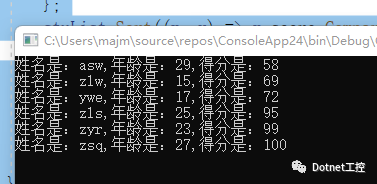排序是我們編程時的常用操作,實現方式也有很多種,本篇文章列舉幾種我常用的用法,希望對大家有用!
數組排序
最常見的排序是對一個數組排序,比如:
int[] aArray = new int[8] { 18, 17, 21, 23, 11, 31, 27, 38 };
第一種:我們最熟悉的冒泡排序法:即每個值都和它后面的數值比較,每次拿出最小值
static void Main(string[] args) { int[] aArray = new int[8] { 18, 17, 21, 23, 11, 31, 27, 38 }; for (int j = 0; j < aArray.Length - 1; j++) { for (int i = 0; i < aArray.Length - 1; i++) { if (aArray[i] > aArray[i + 1]) { int temp = aArray[i]; aArray[i] = aArray[i + 1]; aArray[i + 1] = temp; }
} }
foreach (var a in aArray) { Console.Write($"{a} "); } Console.ReadKey(); }
運行結果:

第二種:利用Array.Sort排序:
① 升序排列:
static void Main(string[] args) { int[] aArray = new int[8] { 18, 17, 21, 23, 11, 31, 27, 38 }; Array.Sort(aArray);
foreach (var a in aArray) { Console.Write($"{a} "); } Console.ReadKey(); }
運行結果:

② 降序排列:先升序排列,然后對數組反轉
static void Main(string[] args) { int[] aArray = new int[8] { 18, 17, 21, 23, 11, 31, 27, 38 }; Array.Sort(aArray); Array.Reverse(aArray);
foreach (var a in aArray) { Console.Write($"{a} "); } Console.ReadKey(); }
運行結果:

02
—
List排序
大多數時候,我們需要將list集合里面的數據進行排序,
① 如果list直接放置的數值類型的數據就比較簡單,比如:
List<int> aList = new List<int> { 18, 17, 21, 23, 11, 31, 27, 38 };方法一:利用List<T> 自帶的Sort排序方法
升序排列:
降序排列:
aList.Sort();
aList.Reverse();
sort也可以用如下方式操作:
list.Sort((a, b) => a.CompareTo(b));//升序
list.Sort((a, b) => b.CompareTo(a));//降序
方法二:利用List的OrderBy與OrderByDescending方法
升序排列:
List<int> aList = new List<int> { 18, 17, 21, 23, 11, 31, 27, 38 };
aList = aList.OrderBy(a => a).ToList();
降序排列:
List<int> aList = new List<int> { 18, 17, 21, 23, 11, 31, 27, 38 };
aList = aList.OrderByDescending(a => a).ToList();
方法三:利用link,這種感覺和方法二是一回事
List<int> aList = new List<int> { 18, 17, 21, 23, 11, 31, 27, 38 };
aList = (from a in aList orderby a ascending select a).ToList();//升序
aList = (from a in aList orderby a descending select a).ToList();//降序
②如果list存放的是一個類型,比如:
方法一: 一個集合存放學生的信息,按照學生的成績升序排列:這里列舉了2種方法,方法一注釋了
static void Main(string[] args) { List<Student> stuList = new List<Student> { new Student() {name = "zyr", age = 23, score = 99}, new Student() {name = "zls", age = 25, score = 95}, new Student() {name = "zsq", age = 27, score = 100}, new Student() {name = "zlw", age = 15, score = 69}, new Student() {name = "ywe", age = 17, score = 72}, new Student() {name = "asw", age = 29, score = 58} };
//方法1 升序 //stuList.Sort((x, y) => x.score.CompareTo(y.score)); //方法2 升序 stuList = stuList.OrderBy(stu=>stu.score).ToList();
foreach (var stu in stuList) { Console.WriteLine($"{stu}"); } Console.ReadKey(); }
public class Student { public string name { get; set; } public int age { get; set; } public int score { get; set; }
public override string ToString() { return $"姓名是:{name},年齡是:{age},得分是:{score}"; } }
運行結果:

方法二: 加入這個學生成績有重復的,對于重復的成績按照年齡再排序:這里列舉了2種方法,方法一注釋了
static void Main(string[] args) { List<Student> stuList = new List<Student> { new Student() {name = "zyr", age = 23, score = 99}, new Student() {name = "zls", age = 25, score = 95}, new Student() {name = "zls", age = 22, score = 95}, new Student() {name = "zsq", age = 27, score = 100}, new Student() {name = "zlw", age = 15, score = 69}, new Student() {name = "ywe", age = 17, score = 72}, new Student() {name = "asw", age = 29, score = 58}, new Student() {name = "ywe", age = 18, score = 72}, new Student() {name = "zsq", age = 16, score = 100}, };
//方法1 升序 //stuList.Sort((x, y) => //{ // int ret = x.score.CompareTo(y.score); // if (ret == 0) // { // return x.age.CompareTo(y.age); // } // else // { // return ret; // } //}); //方法2 升序 //stuList = stuList.OrderBy(stu=>stu.score).ThenBy(stu => stu.age).ToList();
foreach (var stu in stuList) { Console.WriteLine($"{stu}"); } Console.ReadKey(); }
public class Student { public string name { get; set; } public int age { get; set; } public int score { get; set; }
public override string ToString() { return $"姓名是:{name},年齡是:{age},得分是:{score}"; } }
該文章在 2024/3/19 10:35:08 編輯過